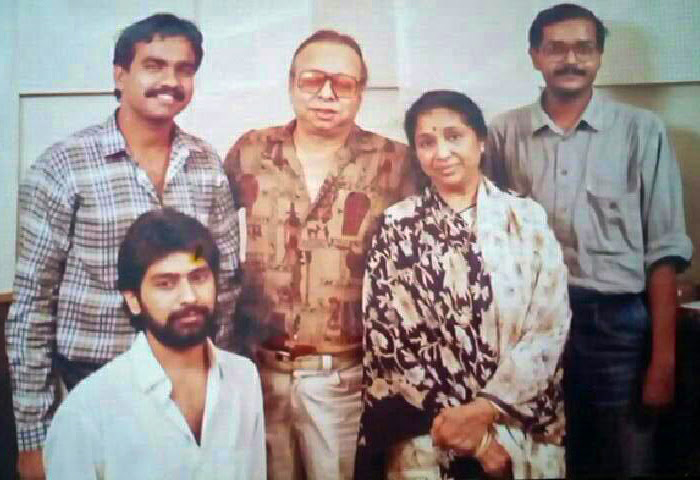I was flipping channels some nights ago and chanced upon Padosan. The late R.D. Burman, India’s musical icon, with a fanatical fan-following, had acted in the film. I watched him engage in some deft comic shenanigans in the company of Mehmood. I was laughing my head off when it hit me that June 27 is his birthday. He would have turned 82 on Sunday, had he not passed away on January 4, 1994, at the age of 54. He was too young to die… a wagon load of Panchamda related memories flashed by…
It was August 1993 when I first met RD Burman. Ash Bhonsle’s son-in-law (now estranged) Hemant Kenkre (a good friend) called me to deliver the good news that Asha was ready to give an interview on the eve of her 60th birthday.Later in October 1993, I also got a chance to do a comprehensive interview with R D Burman in his studio. We started with his latest 1942: A Love Story and went back to his childhood in Calcutta. After two hours into the interview, Asha dropped in and I got a rare chance of catching RD and Asha together with no time limit. I did this interview for Newstrack. Years later I enquired about my story, I was told all tapes including the master print were destroyed in a fire. Sadly, back then there was no digitisation. Luckily I found the transcript of the interview.
Later it was published in 2017 in The Quint.
Also Read: A Rare Classic: Heart to Heart With RD Burman & Asha Bhosle
Today the generation of my children grooves to RD’s remixes. They may not know the composer but his musical hook is sharp. It catches on. Ask any contemporary composer as to who has been the greatest influence on their lives and nine out of 10 times they will name Pancham, as RD was affectionately called. He’s the only composer whose legacy has survived from the ’60s till today. You feel sad that he’s not here today in a place where he would have been better appreciated, better understood.
When I met him in his music studio, Panchamda had undergone a surgery and had not been keeping well. Unable to give his best to his music, his career had hit a rough patch. But that evening, after a long time, he was in high spirits. He was raving about his songs of 1942 : A Love Story.
RD Burman was and will always be one of the most acclaimed music composers of Bollywood. For several decades, he produced iconic music in Hindi and Bengali for as many as 331 films. Fondly known as 'Panchamda' by his fans, Burman weaved nothing but magic with songs.
Rahul Dev Burman was born on 27 June 1939. Born to acclaimed music director SD Burman, he is known to have changed the Indian music scene 360 degrees, and left behind a rich legacy that is still endearing. He composed his first song at the age of nine, which was used by his father in the movie Funtoosh. As per popular stories, of which many versions exist, RD Burman acquired his nickname Pancham because he could cry in five different notes!
Along with Lata Mangeshkar, Kishore Kumar and wife Asha Bhosle, Burman reigned supreme in the Bollywood music industry for years, giving us numerous gems. From foot-tapping numbers to soulful melodies and romantic songs, everything that Pancham da touched turned memorable. Onset of Monsoon, FM radios keep playing the song “Rim Jhim Gire Sawan”sung by Kishore Kumar and Lata Mangeshkar. It is undoubtedly considered as one of the best rain songs to have ever been composed.
Notably, several of Burman's songs, especially the foot-tapping numbers, have been recreated and reproduced in films, private albums and television serials after his death, while a film Dil Vil Pyar Vyar was made as a tribute to his musical genius.
RD aka Pancham da started his professional career way back When he did his first film, Chhote Nawab, in 1961, the world of Hindi film music was dominated by Shankar Jaikishan, Naushad, OP Nayyar, Madan Mohan and his own father SD Burman.
RD was a spontaneous creator, unlike his father, also a legend, who sat with a harmonium at particular times to compose. But then RD had a particular brand of genius.
“Another lesson from my father was that – you must compose 5-6 tunes every day, then you will find that you have at least one worthwhile tune at the end of the day,” Pancham Da had told me.
He was one such artist who created music for his own joy and satisfaction without giving much thought as to what people would appreciate. Shammi Kapoor, who danced beautifully into the hearts of viewers in 1966 to RD’s music in Teesri Manzil, believing that RD was so obsessed with music, he must be creating tunes in his dreams.
Hundreds of wonderful compositions, based on Indian classical music as well as Western music, come to mind immediately — “Raina Beeti Jaaye” (Amar Prem), “Ghar aaja ghir aaye badra saanwariya” (Chhote Nawab), “Yeh shaam mastani” (Kati Patang), “Chura liya hai tumne jo dil ko” (Yaadon ki Baaraat), “Raat kali ek khwaab mein aayi” (Buddha Mil Gaya), “Dum maro dum, mit jaaye gham” (Hare Rama Hare Krishna ), ”Aaj unse pehli mulaqat hogi” (Paraya Dhan), the wonderfully melodious songs of the classic film Padosan including “Sharm aati hai magar aaj yeh kehna hoga”, “Kehna hai, kehna hai aaj tumse yeh pehli baar”, “Mere samne wali khidki mein”, “O mere dil ke chain” (Mere Jeevan Saathi), the Sholay songs and the background score, Aandhi’s songs and those of Love Story — the list is no doubt too long to complete!
The fact is that all these resounding soulful melodies created by Pancham are an integral part of our lives and memories and will always be that way.




















